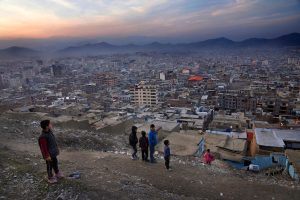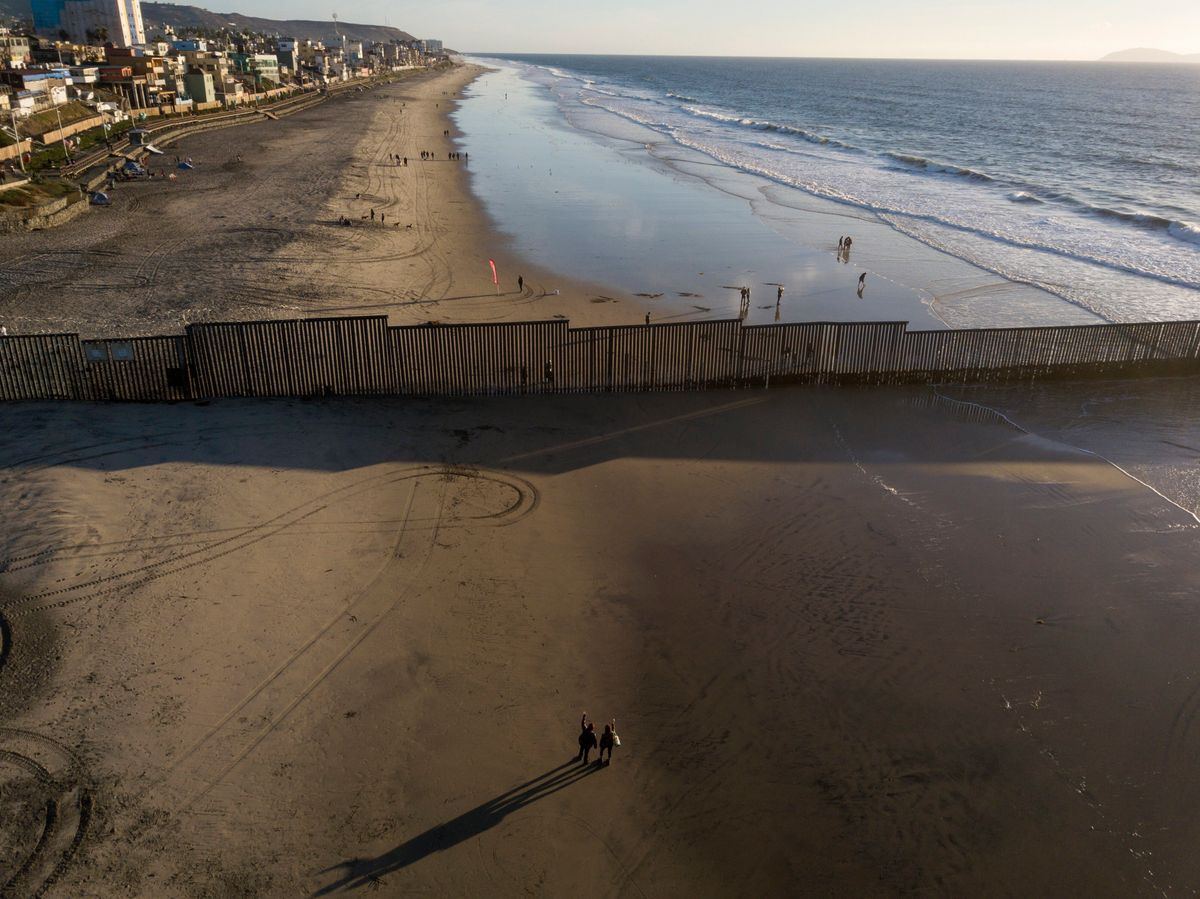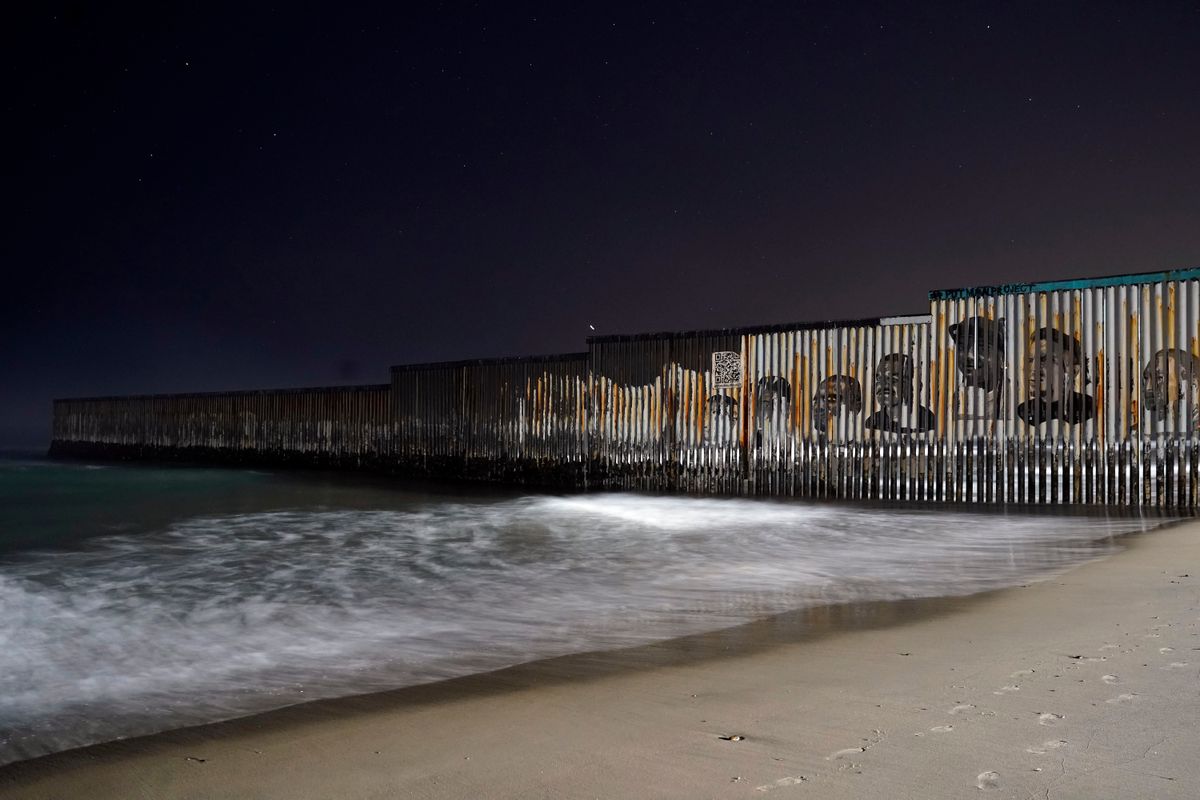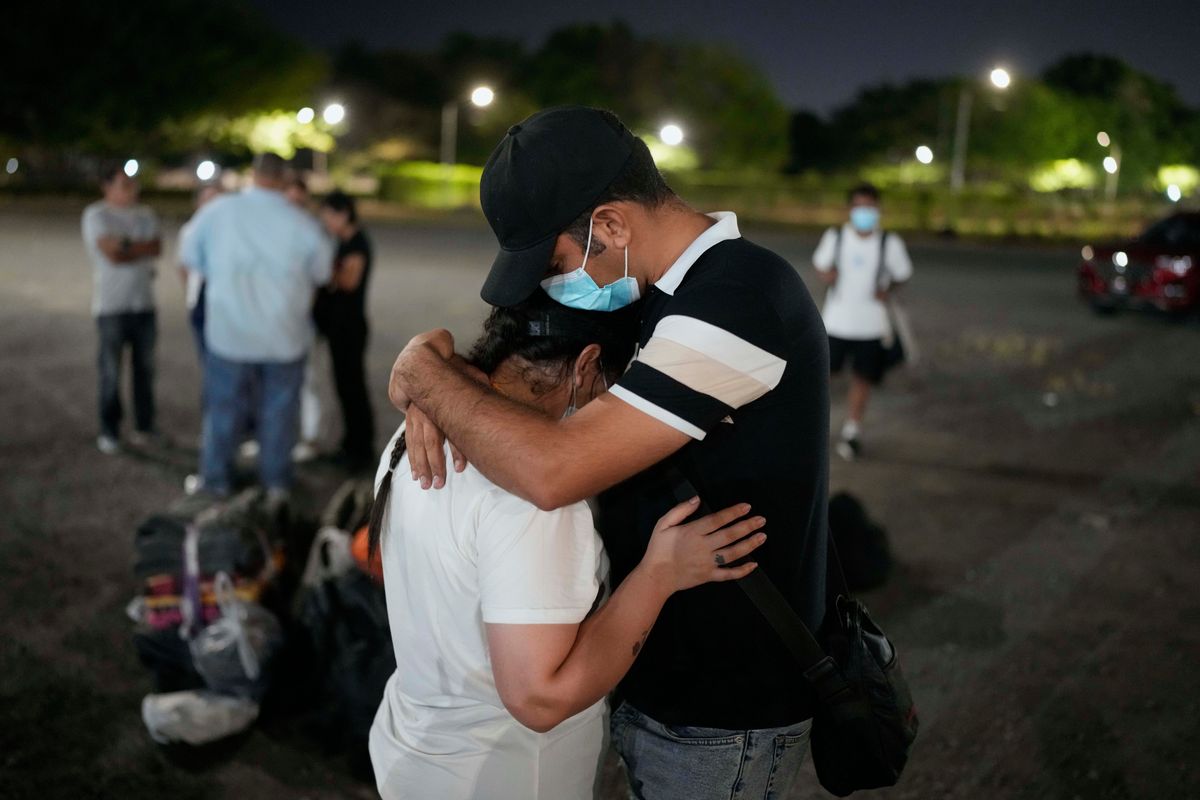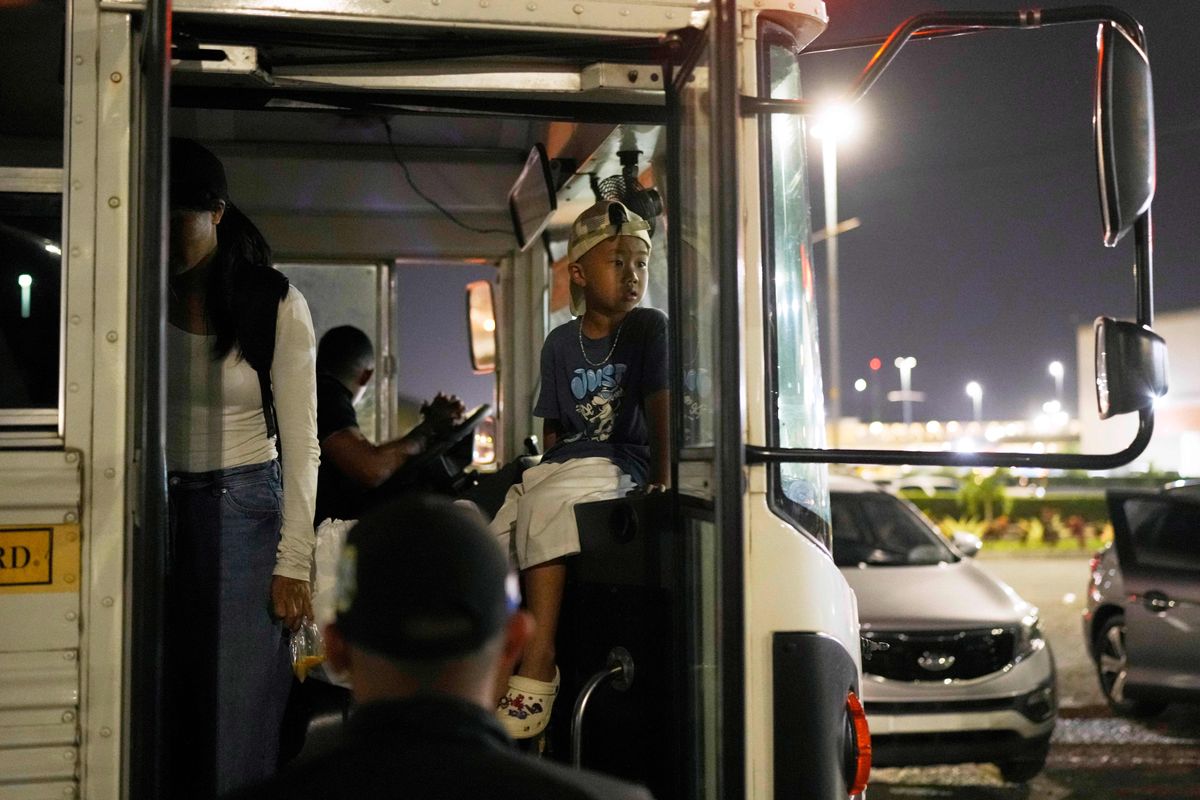As they walked up to the thick metal pillars of the border wall dividing Tijuana and San Diego, the Hussaini siblings carried nothing from their lives in Afghanistan than a hazy fantasy of what awaited them on the other side.
Amir, 21, and his sisters, Suraiya, 26, and Bano, 27, arrived in northern Mexico with an appointment for Jan. 24, four days after U.S. President Donald Trump took office.
That was the day they were supposed to enter the U.S. and make their case, marking what they thought would be an end to the repression by the Taliban after the withdrawal of American troops in 2021, and to their 17,500-mile journey by foot, canoe, bus and plane across the world.
That was all before the door to asylum slammed shut along the U.S. southern border moments after Trump took office. Trump’s victory was based in no small part on support from voters who embraced his hard-line immigration views. Within days, his administration had transformed what it meant to seek refuge in the U.S., casting aside an ethos of helping the persecuted that is nearly as old as the country itself.
Families such as the Hussainis are suffering the cascading consequences of larger political shifts as countries tighten asylum policies and turn away refugees. In Afghanistan, whose tumultuous history is intertwined with American military and foreign policy, the expulsion carried an added sting because the Hussainis believed they would find safe harbor in the U.S.
Instead, Amir watched his sisters being torn away from him by American border agents under the harsh fluorescent lights of a detention facility. It was the last time he saw them.
Half a year later, the family has been dispersed to different countries as part of the administration’s push to send immigrants and refugees to far-flung, unfamiliar and often dangerous places. One sister is trying to navigate life in the far reaches of South America. The second is marooned in Central America. Amir is back in Afghanistan, plagued by fear in the very country the family fled.
“We had reached the end of our journey … and our hopes were completely shattered,” Suraiya said. “I can’t necessarily call it a betrayal, but the fact that they didn’t interview us, ask about our fears or why we fled our country. It all seemed very cruel.”
Watching a future in Afghanistan dissolve
For most of their lives, even as their homeland was riven by war, Suraiya and her siblings never dreamed of leaving.
But as the years rolled on, they watched the life they were building dissolve. That was when they turned to the U.S., which once funneled hundreds of billions of dollars in humanitarian and military aid into Afghanistan, as the place that could offer them a new life.
The Hussainis grew up in an area run by local gangs on the fringes of Kabul, the capital, after the fall of the Taliban in 2001. Their father was a metalworker. Their mother could not attend school but wanted everything for her children.
After centuries of targeted massacres and persecution, the Hussainis’ ethnic minority group, the Hazaras, felt a respite with the Taliban out of power. For women, the doors to education and work finally were opened.
“I never thought I would go to America. I hadn’t even seen American soldiers up close until they left and the Taliban came back” four years ago, Suraiya said. “My family was in Afghanistan. I just wanted to be here doing the things my parents were never able to do.”
Amir, an aspiring musician with thick, curly black hair and an optimistic smile that crinkles the corners of his eyes, would spend weekends working as a wedding DJ. Suraiya, his more reserved older sister, studied computer science in a public university sitting side by side with men.
Suraiya dreamed of a career, but that changed in her third semester in college in 2021, when the Taliban-led government resumed a a yearslong effort to systematically exclude women from much of society.
Taliban officials came to her classes and told women they were no longer allowed to attend school alongside men. She was transferred to a Taliban-run school, where women were only allowed to study dentistry. Ultimately, women were banned from higher education.
For Amir, work evaporated when the Taliban prohibited most forms of music, which they said was against the teachings of Islam. In 2023, authorities announced that religious police would scour wedding halls in Kabul to enforce the ban. In 2024, they announced they had “seized and destroyed” over 21,000 instruments.
“The Taliban told me I had to quit my job a number of times. But if I gave it up, I would have lost everything – my work, my livelihood, my entire way of life,” Amir said.
Under the new government, some of Afghanistan’s millions of Hazaras have been killed in raids and attacks as part of a campaign of violence and discrimination. Suraiya became increasingly scared to go outside. The home she shared with her parents and five siblings felt more like a prison.
“We were considered nothing just because we were Hazaras,” she said.
The Hussainis felt they had no choice but to leave.
The Taliban government did not respond to a request for comment about criticisms of human rights concerns about their treatment of Hazaras and women under its rule.
Crossing continents
To finance their journey to the U.S., the three siblings sold everything they owned in 2023, including a family home.
Along with Bano and her husband, the siblings traveled to neighboring Iran, where they spent a year applying for a humanitarian visa to Brazil. While they waited, Bano gave birth to her first daughter.
In Iran, the family and the baby lived in a ramshackle home in Tehran, eluding detection to avoid being swept up in deportations by Iran’s government. In spring of 2024, their spirits lifted when they boarded a flight to Brazil with new humanitarian visas. A world of possibilities seemed to await.
The airport in Sao Paolo is the starting point for many migrants traveling to reach the U.S. In a span of months, the Hussaini family crossed 11 countries, winding their way north by bus through the high-altitude deserts of Bolivia and the dense forests of the Andes.
Suraiya carried a hair clip her mother had given her and a few totems from friends. Then, in Ecuador, those small pieces of her former life were stolen.
The siblings joined more than a million people who crossed the Darien Gap between 2022 and 2024. Controlled by criminal gangs, the perilous stretch of jungle dividing Colombia and Panama has turned into a migratory highway for those fleeing economic crisis, repression and war.
Suraiya remembers the pouring rain and the crying of her sister’s baby as they trudged through the rainforest. By the time they climbed out of the jungle days later, their shoes were in tatters.
Only able to speak their native Dari, they did their best to learn small words like “amigo” and basic questions to communicate.
One night, she heard that three people, including a 6-year-old child, had drowned in the river next to where they were sleeping.
For the first time, she wondered if they had made a mistake.
“Nothing was as difficult as the jungle. … I had never seen anything like it,” she said. “There was this feeling of regret, but there was no way to go back.”
Asylum contracting globally
As they were traveling, access to asylum was constricting globally. In September, the United Nations refugee agency warned that governments around the world, namely the U.S. and European countries, were increasingly undermining the global convention on refugees and asylum-seekers.
“The institution of the asylum worldwide is under more threat now than it has ever been,” Ruvendrini Menikdiwela, assistant high commissioner for protection at the agency, told reporters.
Experts describe the shift as “protection fatigue” triggered by rising rates of displacement around the world.
By the end of 2024, 123.2 million people worldwide – approximately 1 in 67 people – were living forcibly displaced from their homes, according to the U.N.
“Governments have gotten much less tolerant of asylum,” said Susan Fratzke, a senior policy analyst at Migration Policy Institute. “Rather than trying to solve these problems within their asylum systems, they’re increasingly turning to measures that really push the boundaries of what’s legal.”
Democratic President Joe Biden’s administration had already been cutting access to asylum and trying to slow the flow of migrants before the 2024 election. Under Republican Trump, access to asylum along the U.S-Mexico border has virtually disappeared.
Governments from Europe to Australia to Asia have heightened restrictions and even imposed laws criminalizing asylum-seekers.
Nigel Farage, the head of the United Kingdom’s far-right party, promised to carry out mass deportations if it wins elections next year, regardless of the dangers that asylum-seekers may face back home.
“We cannot be responsible for all the sins that take place around the world.” Farage said.
‘No other country will take you’
Amir, Suraiya, Bano and her husband and daughter arrived in Mexico in the fall of 2024. Like many asylum-seekers, they spent nearly half a year in limbo waiting for the chance to make their case to American authorities.
They would wake up and immediately apply for an appointment on a Biden-era app, known as CBP One, a daily lottery under which more than 900,000 people entered the U.S. without a visa for up to two years, with eligibility for a work permit and a shot at getting asylum through immigration courts. It was a game of chance and patience more than circumstance.
To pay for a small room they shared with other migrants, they cleaned the streets of Mexico City for coins. They went to bed each night unsure of their fate.
In January, they received word that their names were selected. As they made their way to the Tijuana-San Diego border, their once-vague ambitions gave way to imaginings of returning to college, finding work and building a life in the U.S.
But the date of their appointment was Jan. 24, four days after Trump took office. Their plan to seek asylum disappeared when his new administration shut down the app and canceled all appointments, stranding tens of thousands of people like the Hussainis in Mexico.
Desperate, the family decided to cross the border illegally and present themselves to authorities as refugees in early February. American and international law allows vulnerable populations to seek asylum regardless of whether they enter legally, but under Trump that has virtually disappeared.
The family crossed a muddy Alamar River running along the border. Reeking of sewage, they were detained by Border Patrol agents who brought them to a detention center near San Diego that was wedged between farms along the border fence.
The few belongings — phones, passports and a small packet of medicine — they had left were seized and the family was torn apart.
Locked in the concrete facility for more than a week and wearing the same grimy clothes, the siblings begged authorities to see each other or to call family in Afghanistan and in the U.S. for help.
It was all in vain. They were not told where they were going and were not permitted to present their asylum case.
“You have no options,” Suraiya remembers being told by U.S. Customs and Border Protection officers. “Because you have been in prison here in the U.S., no other country will take you.”
Within weeks, the Hussaini siblings were loaded onto three separate planes that would scatter them overseas, setting each on very different paths.
Department of Homeland Security spokesperson Tricia McLaughlin said their case was a “sob story” and that reporting on their separation was “pure garbage.” She did not answer multiple questions inquiring why the siblings were separated and sent to other countries. She said those seeking humanitarian protection should ask at official border crossings, not enter illegally, even as that path has become largely impossible under Trump.
“These are grown adults who made a choice to try and enter our country illegally,” she said.
A family torn apart
Amir felt utterly alone.
It was March. He had spent two sleepless days and nights aboard commercial airlines with no hint where he was headed.
His plane stopped in Dubai, where he stepped out into the white halls and flashing lights of the airport. Armed guards met him, soon confirming his suspicion that he would be returned to Afghanistan.
He sobbed for hours in a cell at the airport and begged guards not to send him back. He went to the restroom and tore up documents confirming his asylum appointment and deportation papers, anything that could provide evidence to the Taliban that he had sought asylum in the U.S.
Shortly after, he said he was forced aboard a plane to Kabul.
“At first there were two soldiers, then there were four. I kept refusing to board and they dragged me onto the plane while I cried,” he said.
The stories of people like the Hussainis are mostly lost in the headlines about U.S. Immigration and Customs Enforcement raids and deportations, which have only accelerated.
ICE averaged 710 arrests a day during Trump’s first six months in office, up from 311 a day during the final budget year under Biden, according to agency data obtained by Deportation Data Project, based at University of California, Berkeley and analyzed by The Associated Press.
Less visible is the human toll of the policies and what is in store for those denied asylum when they return home.
Migrants are often dropped back into the circumstances that forced them to flee, and they also often face a combination of economic deprivation, physical danger and social exile.
In Afghanistan, with no political opposition, the Taliban wield unchecked power and have targeted everything from civil society to musicians, while extremist groups attack Hazara minorities.
The U.N. has urged member nations not to deport anyone, even those who have been denied asylum, to Afghanistan.
In a July report, the U.N. warned that people being returned to Afghanistan increasingly face “threats, arbitrary arrest, detention, torture and ill-treatment” only exacerbated by closing pathways out of the country. As a result, they are forced into hiding.
Despite that, ICE arrests of Afghans in the U.S. have jumped along with that of people of other nationalities since Trump took office, compared with arrests during the final year of the Biden administration.
Living in the shadows in Afghanistan
Back in Afghanistan’s capital of 5 million people, fear follows Amir like a shadow.
When he returned, he walked through the Kabul airport with his eyes cast downward, terrified he would be targeted.
“The dangers I face are these: If I am arrested, I will be questioned about why I left the country. Secondly, I might be accused of being a spy because I came back from America,” he said. “Simply fleeing the country is itself considered a threat.”
Every night, he tries to sleep in a new place, often with friends or extended family, though many of them have cast him away, worried they could become targets.
“Most nights I am alone. I try not to communicate with many people,” he said.
After he had his phone searched at a police checkpoint, Amir began to delete messages and contacts in his phone. He wants to work, but worries that returning to the same place every day could draw attention. That’s only been exacerbated by soaring unemployment and instability fueled by mass-expulsions of Afghans from nearby countries.
His money gone, Amir has been left to ask friends for assistance.
He awakens each day to shrinking options. Sleep eludes him, fear grips him, hunger torments him. He tries to not let hopelessness overwhelm him.
“I’ve lost everything.” he said. “You lose hope in life.”
Dropped in a legal ‘black hole’ in Central America
Amir’s sisters tried to track him down and search for help, writing aid groups and anyone they could for help or more details on his whereabouts. That was when Suraiya first messaged The Associated Press, and when months of correspondence with journalists began. AP later spoke to Suraiya from a migrant refuge in Panama, with Amir over the phone as he hid away in Kabul, and maintained contact with them in their native Dari since.
The sisters struggled to aid their brother as they struggled in their own world of precarity.
In early February, his sisters were awakened by officials in the morning in their cells in the California detention center and loaded onto separate flights to Central America.
Bano, her husband and 1-year-old daughter were sent to Costa Rica. Suraiya was sent alone to Panama, part of a larger deal struck with the U.S. government.
They were sent with 400 other people fleeing war and repression in Afghanistan, Iran, Russia, China and Sudan, and were among the first to be deported from the U.S. and dropped in third countries. Others have been sent to El Salvador, South Sudan, Eswatini and Mexico.
Human rights groups have argued that those deportees have been dropped into a legal “black hole,” part of a punitive strategy by the administration to dissuade others from attempting the journey north. Panama’s then-vice foreign minister told the AP that the government was detaining deportees such as Suraiya to help the Trump administration “send a signal of deterrence.”
In October, the chief of the U.N’s refugee agency suggested that Trump’s deportations practices were breaking international law.
Without speaking Spanish or English or having the money to pay for a lawyer, people deported to third countries often lack basic legal protections and have few ways out.
The increasing use of such deportations have fueled concern that the governments are creating a roving population of migrants with few safeguards.
In a September AP-NORC poll, three in four of those polled said the U.S. opening its doors to refugees fleeing violence in their own countries should be a high or moderate priority, marking a slight warming by Americans toward refugee populations since just before Trump took office. Nearly half of Americans maintain that Trump’s deportation efforts have gone too far, an opinion split along partisan lines.
‘We cannot stay here’
Suraiya stepped out of the military plane into thick tropical air feeling disoriented. She tried to figure out where she was. Then she saw guards with uniforms that said “Panama,” the same place she had passed through months before.
She and some 200 migrants were locked into hotel rooms in the country’s capital. While some deportees held up signs reading “help,” Suraiya peered down at the city from her window, held a hand up to her head and cried.
“It was a feeling of hopelessness and heartbreak, like being beaten down,” she said. “After all the hardships, after the long journey and the struggles of the jungle, they brought us back.”
One late February night, she said Panamanian officials took them from their beds and drove them to a remote camp in the Darien Gap, where their phones were seized.
In jungle heat, guards threatened to send them back to their home countries, and fed the detainees rotten food, Suraiya, other detainees and human rights groups said. Officials refused to provide an increasing number of sick people medicine unless they paid, detainees said.
Facing international criticism, Panamanian authorities dropped Suraiya and others on the streets of Panama City. Human rights groups later offered them shelter in a former school.
It was there, in the small brick gymnasium, that she heard from her siblings for the first time in weeks.
In Costa Rica, Bano and her family were bused with hundreds of others to a former factory that was turned into a migrant detention facility along the Panama border.
The hundreds of migrants, including 81 children, were barred from leaving the facility for months. That led to a lawsuit by a human rights group arguing that the government had subjected the kids to “inhumane treatment.”
Later released and given temporary protections in Costa Rica, Bano and her family have spent the past months applying for asylum in Canada and Switzerland. She said the countries refused.
“In Costa Rica, we have no one from our country, no friends, no family, and no money,” Bano said. “We cannot stay here.”
What weighs on Suraiya most, though, is her brother.
She spends her days glued to her phone in a sparsely furnished room she shares with other Afghan deportees, checking on Amir and writing to human rights organizations. A small fan cuts through the afternoon heat.
“From afar, I can’t help my brother at all,” she said. “I saw with my own eyes everything he went through on our journey. I knew his goals, his dreams. But when he was deported to Afghanistan, I knew that was all gone.”
Finding refuge in one country willing to open its doors
In September, Suraiya finally found some relief as she boarded a plane out of the Panama City airport.
After months of humanitarian groups searching and herself going door to door to foreign consulates with other Afghans in a push to find any place that would accept them, Chile agreed to open its doors.
As she looked out on the Andean mountains towering over the Chilean capital, Santiago, and wandered the streets of her new city, she allowed herself to wonder what her new life would look like.
Perhaps she would return to school. She thought first of getting Amir out of Afghanistan, then of her sister stranded in Costa Rica, then her younger sisters whose studies had been cut off just like hers. She thought of the future she could finally build.
When she arrived at her new home and called her parents, the first thing she said was, “All I want is for you to come so we can build a life together.”
——
Associated Press photojournalist Matias Delacroix contributed to this report from Panama City.
By MEGAN JANETSKY
Associated Press

